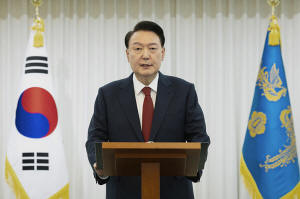South Korea’s parliament votes to impeach President Yoon Suk Yeol over
his martial law order
 Send a link to a friend
Send a link to a friend
 [December 14, 2024]
By HYUNG-JIN KIM and KIM TONG-HYUNG [December 14, 2024]
By HYUNG-JIN KIM and KIM TONG-HYUNG
SEOUL, South Korea (AP) — South Korea’s parliament voted Saturday to
impeach President Yoon Suk Yeol over his short-lived martial law decree,
a historic rebuke that was cheered by jubilant crowds who described the
outcome as another defiant moment in the nation’s resilient democratic
journey.
The National Assembly passed the motion 204-85 in a floor vote. Yoon’s
presidential powers and duties will be suspended and Prime Minister Han
Duck-soo, the country’s No. 2 official, will take over his authority
once copies of a document on the impeachment are delivered to Yoon and
to the Constitutional Court.
The court has up to 180 days to determine whether to dismiss Yoon as
president or restore his powers. If he’s thrown out of office, a
national election to choose his successor must be held within 60 days.
It was the second National Assembly vote on Yoon's impeachment motion.
Last Saturday, Yoon survived an impeachment vote after most ruling party
lawmakers boycotted the floor vote. Some People Power Party lawmakers
had since announced their intentions to vote for Yoon's impeachment in a
second vote, as public protests against Yoon intensified and his
approval rating plummeted.
National Assembly Speaker Woo Won Shik said Yoon’s impeachment was an
outcome driven by “the people’s ardent desire for democracy, courage and
dedication.”

Hundreds of thousands of people gathered near the parliament roared in
jubilation, waved banners and brandished colorful K-pop glow sticks, as
a lead activist shouted on stage that “We have preserved the
constitutional order!”
In a central Seoul plaza, another huge crowd of people supporting Yoon
gathered, but they grew subdued after hearing Yoon had been impeached.
Both rallies have largely been peaceful.
Yoon issued a statement saying he would “never give up” and calling for
officials to maintain stability in government functions during what he
described as a “temporary” pause of his presidency.
“Holding in my heart all the criticism, encouragement, and support
directed at me, I will do my best for the country until the very last
moment,” he said.
Yoon’s Dec. 3 imposition of martial law, the first of its kind in more
than four decades in South Korea, lasted only six hours, but has caused
massive political tumult, halted diplomatic activities and rattled
financial markets. Yoon was forced to lift his decree after parliament
unanimously voted to overturn it.
After declaring martial law, Yoon sent hundreds of troops and police
officers to the parliament to try to impede its vote on the decree,
before they withdrew after the parliament rejected it. No major violence
occurred.
Opposition parties and many experts accuse Yoon of rebellion, citing a
law that categorizes as rebellion the staging of a riot against
established state authorities to undermine the constitution. They also
say that a president in South Korea is allowed to declare martial law
only during wartime or similar emergencies and has no right to suspend
parliament’s operations even under martial law.
The impeachment motion alleged that Yoon “committed rebellion that hurts
peace in the Republic of Korea by staging a series of riots.” It said
Yoon’s mobilization of military and police forces threatened the
National Assembly and the public and that his martial law decree was
aimed at disturbing the Constitution.
[to top of second column]
|

In this photo released by South Korean President Office via Yonhap,
South Korean President Yoon Suk Yeol speaks at the presidential
residence in Seoul, South Korea, Saturday, Dec. 14, 2024. (South
Korean Presidential Office/Yonhap via AP)

In a fiery speech on Thursday, Yoon had rejected the rebellion
charges, calling his order an act of governance. The conservative
Yoon said he aimed to issue a warning to the main liberal opposition
Democratic Party, calling it “a monster” and “anti-state forces”
that he argued has flexed its legislative muscle to impeach top
officials and undermine the government’s budget bill for next year.
He claimed the deployment of troops was meant to maintain order,
rather than disrupt it.
Democratic Party leader Lee Jae-myung called Yoon’s speech a “mad
declaration of war” against his own people.
Observers say Yoon’s speech suggested a focus on legal preparations
to defend his martial law decree at the Constitutional Court, even
as opinion surveys showed more than 70% of South Koreans supported
his impeachment. A survey released Friday put Yoon’s approval rating
at 11%, the lowest since he took office in 2022.
Some of Yoon's claims don't align with testimony by some military
commanders whose troops were deployed to the Assembly.
Most notably, Kwak Jong-keun, commander of the Army Special Warfare
Command, said that after martial law was announced, Yoon called him
and asked for his troops to “quickly destroy the door and drag out
the lawmakers who are inside.” Kwak said he didn’t carry out Yoon’s
orders.
Yoon is the third South Korean president impeached while in office.
In 2016, parliament impeached Park Geun-hye, the country’s first
woman president, over a corruption scandal. The Constitutional Court
upheld her impeachment and dismissed her from office.
In 2004, President Roh Moo-hyun was impeached at parliament over an
alleged election law violation but the court later overturned his
impeachment and restored his presidential powers. Roh jumped to his
death in 2009, after he had left office, amid a corruption scandal
involving his family.
Yoon has been banned from leaving South Korea, as law enforcement
authorities are investigating whether he and others involved in the
martial law declaration committed rebellion, abuse of power and
other crimes. If convicted, the leader of a rebellion plot can face
the death penalty or life imprisonment.

Yoon has the presidential privilege of immunity from criminal
prosecution but that doesn’t extend to allegations of rebellion or
treason. Subsequently, Yoon could be investigated, detained,
arrested or indicted over his martial law decree, but many observers
doubt that authorities will forcefully detain him because of the
potential for clashes with his presidential security service.
Yoon’s defense minister, police chief and the head of Seoul’s
metropolitan police agency have been arrested over their roles in
the martial law case. Other senior military and government officials
also face investigations.
All contents © copyright 2024 Associated Press. All rights reserved |